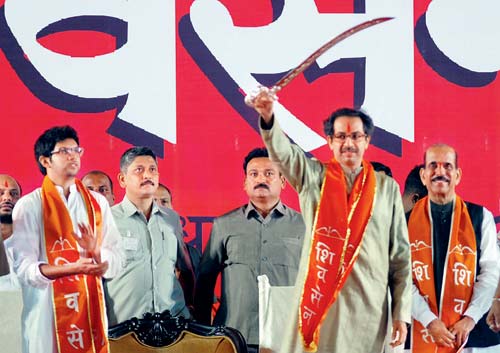Mumbai, Oct 14: A day after the high decibel campaign for Maharashtra Assembly polls ended, the Shiv Sena today launched a fresh attack on its former ally BJP, terming it as "hungry for power" even as it likened the Congress and the NCP to "dead snakes".
 "The BJP asks us who the real enemy of Shiv Sena is and who are we fighting against. But the Congress and the NCP are like dead snakes, so there is no danger to us from these parties. But it is imperative now, for the benefit of Maharashtra, that we bring to forefront the hypocrisy of our one-time friends," the Sena said in its editorial mouthpiece 'Saamna'.
"The BJP asks us who the real enemy of Shiv Sena is and who are we fighting against. But the Congress and the NCP are like dead snakes, so there is no danger to us from these parties. But it is imperative now, for the benefit of Maharashtra, that we bring to forefront the hypocrisy of our one-time friends," the Sena said in its editorial mouthpiece 'Saamna'.
Terming BJP as a party "hungry for power", Sena said their former ally's sole motive is to defeat them, which prompted it to unilaterally snap the 25-year-old alliance with Sena.
"The BJP brought a large contingent of its MPs from various states to the battleground. The Prime Minister, the Home Minister and several Central ministers too were roped in to ensure the defeat of the Sena," it said.
The Sena also accused the BJP of indulging in caste-based politics and regionalism.
"Until yesterday, regional leaders like (SP chief) Mulayam Singh Yadav, (RJD president) Lalu Yadav and (former Haryana Chief Minister) Bhajan Lal used to come here (Maharashtra) and indulge in votebank politics. And today it seems that entire Gujarat has come to Maharashtra to try and muddle the minds of Gujarati voters.
"But the commitment of Gujaratis for Maharashtra and their love for Balasaheb Thackeray will make them stand behind the Sena without doubt," it added.
The state Assembly polls for the 288-member House will be held tomorrow.





Comments
Add new comment